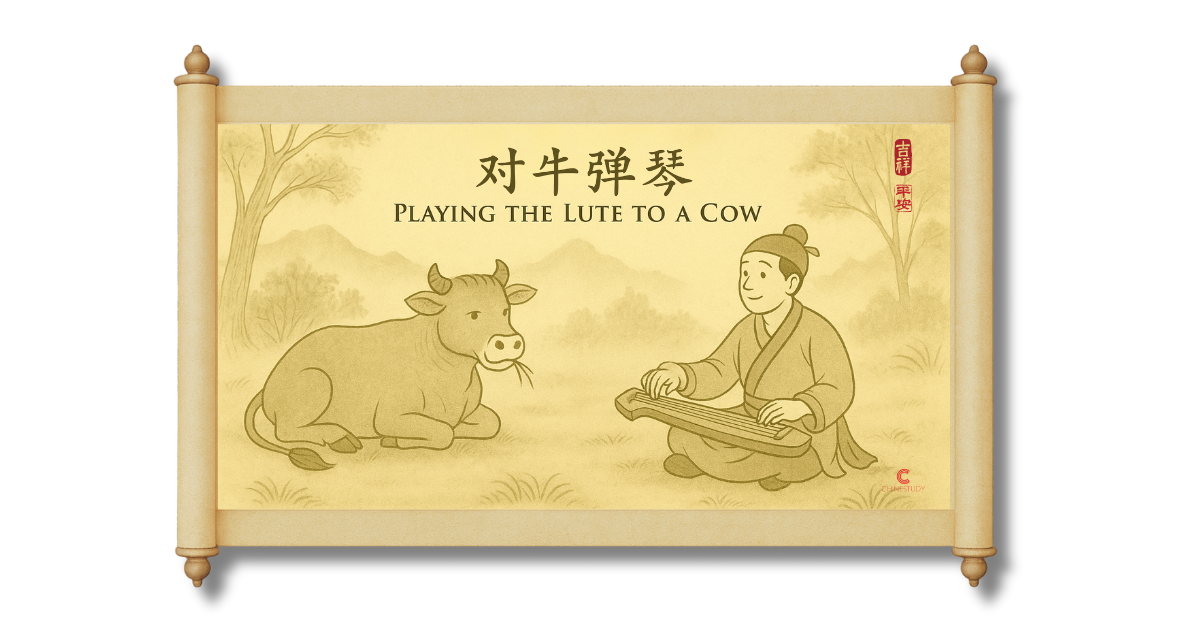🐮 对牛弹琴 duì niú tán qín – Playing the Lute to a Cow

🔍 What It Means
对牛弹琴 (duì niú tán qín) literally means “play the lute to a cow.”
Word-for-word:
- 对 (duì) – toward
- 牛 (niú) – cow
- 弹 (tán) – play (an instrument)
- 琴 (qín) – lute, a traditional string instrument
This idiom describes a situation where someone says something meaningful, but the listener doesn’t understand or appreciate it.
It often suggests wasted effort when trying to explain something deep or refined to someone who can’t grasp it.
In English, it’s like saying:
- 🎻 “Preaching to the deaf”
- 🪵 “Talking to a brick wall”
- 🐷 “Casting pearls before swine”
🏺 Where It Comes From
This idiom comes from an old Chinese fable.
A man loved to play the lute and was confident in his music.
One day, he sat down in front of a cow and played a beautiful melody.
The music was elegant and emotional, but the cow just kept chewing grass.
It didn’t react at all.
The man was confused — until he realized:
The cow couldn’t understand the music.
So he changed the tune.
This time, he played sounds like mosquitoes buzzing, cows mooing, and calves calling.
The cow finally stopped eating and listened carefully.
That became a metaphor:
If the listener can’t understand, even the best message won’t get through.
💬 How to Use It
Use 对牛弹琴 when someone is explaining something, but the other person just doesn’t get it.
- ❌ It’s negative – it suggests a mismatch between speaker and listener.
- ✅ Often used when someone is wasting time explaining something too advanced or too refined for the audience.
🎯 Real Examples
1. 跟他谈艺术就是对牛弹琴。
- Gēn tā tán yìshù jiù shì duì niú tán qín.
- 👉🏻 Talking to him about art is like playing the lute to a cow.
2. 她完全听不懂你的专业词汇,别再对牛弹琴了。
- Tā wánquán tīng bu dǒng nǐ de zhuānyè cíhuì, bié zài duì niú tán qín le.
- 👉🏻 She doesn’t understand your technical words at all — stop wasting time.
⚠️ Common Mistakes (Watch Out!)
❌ Mistake: Thinking it means “to try hard to explain something”
✅ Correct: It means explaining to someone who can’t or won’t understand
💡 Memory Tip

Imagine you’re playing beautiful music with a traditional Chinese lute.
You pour your heart into the melody.
But in front of you is a cow… just staring blankly. 🐮
No reaction at all.
That’s 对牛弹琴 — when your message is meaningful, but the audience just isn’t right.
🧩 Interactive Practice
Translate this sentence into English:
- 别跟他解释了,简直是对牛弹琴。
Answer:
Don’t bother explaining to him — it’s like talking to a wall.
🌟 Final Thoughts
对牛弹琴 reminds us that good communication needs the right audience.
Even the best message fails if the listener isn’t ready to understand.
☝️ Ask yourself: Am I sharing my thoughts with someone who will understand — or just playing to a cow? 🐮
👉 Stay tuned for the next idiom in this series!
Thank you for subscribing!
Have a great day!